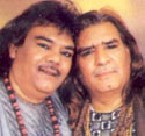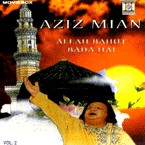Adil Najam
This post was originally posted on October 19, 2006. It is being reposted with the addition of some new Qawali video clips.


As I was driving back from work tonight, I had an old Sabri Brothers cassette playing in my car. The window was down, the sound was loud. As I stopped at a red light, my head still nodding to the rhythms, I noticed that the American woman in the car parked next to me was staring at me with a rather perplexed look (Bostonians don’t often get to hear the Sabri bradraan!). She shouted over the music to ask me what type of music this was and from where. I smiled and told her. I am not sure if she heard what I said over the noise because the light turned green just then and we went our different ways.
I guess she left wondering what the beat and sound was about. I left wondering what has happening to qawalli in Pakistan today? Who are the big names out there? Are there any? Is there any Ghulam Farid Sabri, Aziz Mian, Nusrat Fateh Ali equivalent out there? I know of Rahat Fateh Ali Khan, but he seems to be mostly re-rendering Nusrat Fateh Ali Khan’s work. Who else?
I was a qawalli fan while I was still in school; long before there was a Nusrat Fateh Ali Khan and long before it was kool to be a qawalli fan. I don’t know why I was a fan; no one else around me was. I guess the beat was enticing, the stories interesting, and the qawals colorful. I suspect that those around me thought it was rather odd that I liked qawalli so much; but then, people around me have always considered me odd!
This was the era when the Sabri Brothers Qawall and Aziz Mian Qawall were at the peak of their prowess. They were both major innovators of the qawalli genre. Many purists consider them blasphemous not just because they moved qawalli from being predominantly religious – devotional to everyday-mundane. Remember, the ‘Paani ki qawalli’ and ‘Paisay ki qawalli’ (both by the Sabris) and the populist poetry extravaganzas of Aziz Mian (which often were more Munni Begum than Aziz Mian).
I guess I like qawalli for the same reason I like Johnny Cash and Waris Shah. They all have great stories to tell. And what could be more enticing than a good beat combined with a good story!
I found this video clip of this Sabri Brothers Qawall rendition of an old devotional qawalli. It is not the best recording but it is one of their most popular religious qawallis. And this being Ramzan – yes, I am sticking to Ramzan with a ‘Z’ – it is timely because it used to be a staple of the Sehri transmissions on PTV. Enjoy!
And while we are at it here is a clip of a classical Aziz Mian performance:



















































Thank you Adnan, Mansoor Al-Hallaj’s proclamation is indeed the essence of Haq Bahu Bayshak Bahu.
I was introduced to Qawwali, when I was too young to walk! My father appreciates the genre quite a bit and carried me along when my parents attended ‘Qawwali Nights’. Later, I remember listening to the Sabri Brothers, among others, on Doordarshan i.e. the Indian state-owned television channel.
However, as I reached my teenage years, there was a Rock and Heavy Metal phase in my life and Qawwali and I remained apart for a long while.
We were re-united much later, after I had completed college and started working. The depth, sincerity and beauty of Sufiana qalaam touched my heart.
I still do listen to other genres as well, but when I plug in my ear-phones and listen to a devotional qawwali, I feel transported to another world altogether. It is a very spiritual experience for me.
Nusrat Fateh Ali Khan Saaheb has rendered rather well, some verses from ‘Gurbani’ in the Qawwali genre and I enjoy listening to those too, along with his other devotional qawwalis where the musical instruments comprise nothing except the harmonium and the tabla. I wish he had lived for many more years. God bless his soul!
Abida Parveen’s rendition of Sufi poetry by Baba Bulle Shah, Waris Shah, Sultan Bahu and the like, is excellent.
Often I listen to qawwalis, through ear-phones, while working on the computer, and it not only drowns out noise from the rest of the world, but I feel it also helps improve my productivity and efficiency. At least that is what I told my bosses… :D
Excuse me for writing a rather longish comment…I sort of got carried away!!
MQ, I liked your observation too. I remember about ten years ago I was watching Abrar perform billo de ghar in an open air pakistan day concert in d.c. and in the middle of the song african americans stage workers broke lose and, what they say, just went with the flow. I think we are talking about two cultures here linked with rhythm and music.
Haq, bahu! Bashak, bahu!
I think it means: truth, Bahu! without a doubt, Bahu! I believe Sultan Bahu was thinking Mansoor in these words.
Aziz miaN was awesome, so were sabris and later nfak. Each one had his own little niche, I miss them all so bad. NFAK’s breadth of music and style was unmatched, sabris’ commitment to religious themes unique, and Aziz’s miaN’s excellent choice of poetry. Marhoom’s son Imran Aziz mian has a good voice but that’s all he got, no poetic talents like his father. Similarly, Rahat Fateh Ali might know how to sing, but where would he get the creative impulsives that his prolific uncle possessed? Same is the story of the new generation of Sabris.
The impact of qawwali or, for that matter, the perpetual influence of music or rhythm on human beings reminds me of a she’r:
Rahay na Aibak-o-Ghauri kay ma’rkay baaqi
Hamaisha taaza-o-shireen hai naghma-e-Khusro
[No one remembers the battles of of Aibak or Ghauri, but the music of Khusro remains fresh and sweet as ever ]
Incidentally, these lines are not from any fun-loving poet but from the “Poet of the Umma” — Allama Iqbal.